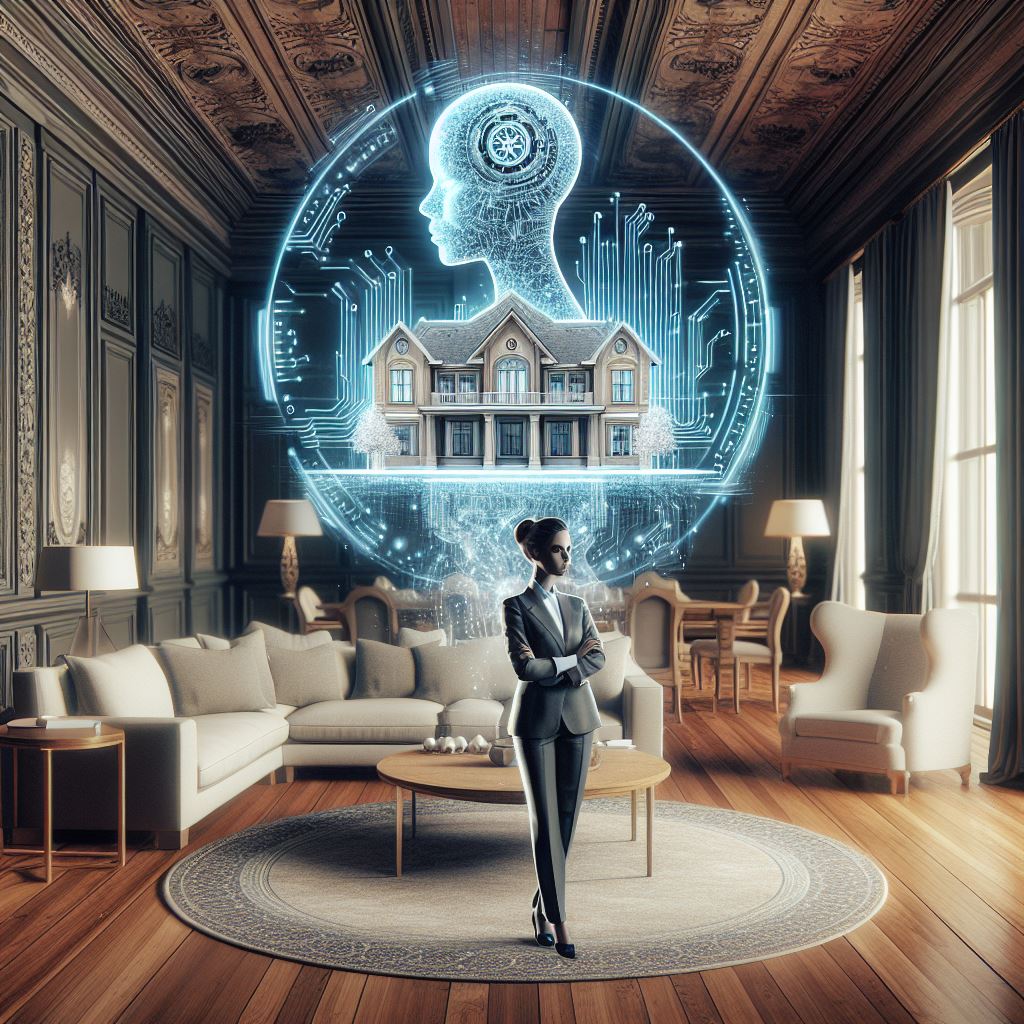Introduction
AI-driven homes are quickly becoming a reality, transforming the way we live.
These homes utilize artificial intelligence technology to automate various tasks and enhance efficiency.
Currently, AI-driven homes are still in the early stages of development and adoption.
However, there is a noticeable surge in interest and demand for such homes, especially among the elite.
The affluent segment of society seeks cutting-edge technology and exclusivity in their living spaces.
AI-driven homes provide the perfect blend of luxury and convenience, appealing to their discerning taste.
These homes offer features like smart assistants, facial recognition systems, and personalized automation.
With AI, the homes can learn homeowners’ preferences over time, making their lives more comfortable.
AI-driven homes also prioritize security, with advanced surveillance systems and real-time monitoring.
As technology continues to advance, the capabilities of AI-driven homes will expand further.
Soon, these homes will integrate seamlessly with other smart devices and create a cohesive living experience.
The rise of AI-driven homes demonstrates the increasing influence of technology in our daily lives.
In essence, AI-driven homes are on the rise, catering to the demands of the elite by providing luxury, convenience, and security through advanced artificial intelligence technology.
The Rise of AI-Driven Homes
Overview of AI technology advancements
AI technology has made significant advancements, allowing for the integration of smart devices and automation.
Voice recognition has improved, enabling better communication between humans and AI-powered assistants.
Natural language processing algorithms have become more sophisticated, enhancing AI’s ability to understand and respond to human commands.
Machine learning capabilities have expanded, enabling AI systems to continuously improve and adapt based on user preferences.
AI technology has become more affordable and accessible, making it increasingly feasible for home integration.
The future is undoubtedly AI-driven, and homes of the elite are at the forefront of this technological revolution.
As AI technology continues to advance, its integration into our daily lives becomes more seamless and natural.
From voice-controlled automation to personalized experiences, AI-driven homes offer a glimpse into the future of living.
While currently limited to the elite, as technology becomes more affordable and accessible, AI-driven homes will likely become more prevalent among the general population.
Adoption of AI technology in other industries
AI technology has been widely adopted in sectors such as healthcare, finance, and transportation.
Chatbots powered by AI are being utilized by businesses to provide customer support and improve efficiency.
Machine learning algorithms are being used to analyze big data and make predictions in various industries.
Automated systems driven by AI are being used in manufacturing and logistics to optimize processes.
AI is revolutionizing the entertainment industry through personalized recommendations and content creation.
AI technology advancements have paved the way for the integration of smart devices, automation systems, and personalized experiences.
The adoption of AI technology in other industries has showcased its potential and benefits, leading to its widespread use in various sectors.
Among the elite, AI-driven homes have become a status symbol, providing luxury, convenience, and advanced security features.
From automated systems to virtual assistants, AI technology is transforming the way we live.
Current trends in AI-driven homes among the elite
The elite are embracing AI-driven homes as a symbol of luxury, convenience, and status.
Homes equipped with AI technology offer enhanced security systems with facial recognition and smart locks.
AI-powered assistants, like Amazon’s Alexa and Google Home, are being integrated into smart homes for voice-controlled automation.
Smart thermostats and lighting systems that learn and adjust to user preferences are becoming commonplace.
AI is being utilized to manage energy consumption, optimizing efficiency and reducing costs.
Virtual AI assistants are being integrated into home management systems to handle tasks such as grocery shopping and scheduling.
AI technology is being used to monitor health metrics and provide personalized fitness and wellness recommendations.
As the demand for AI-driven homes increases, developers and innovators will continue to push the boundaries of what is possible.
The future holds the promise of even more advanced AI systems that seamlessly integrate into our homes, providing personalized experiences and improving our quality of life.
With AI-driven homes, the future is now.
Read: Tech Integration in Luxury Property Decor
Benefits of AI-Driven Homes
Increased convenience and automation
AI-driven homes offer a higher level of convenience, making daily tasks easier and more efficient.
Smart appliances and devices can be controlled remotely, allowing homeowners to manage their homes from anywhere.
Automation technologies can handle routine tasks, such as adjusting lighting and temperature, saving time and effort.
AI can learn homeowners’ preferences and adapt to their habits, providing a personalized and tailored experience.
Virtual assistants, powered by AI, can answer questions, set reminders, and provide information, creating a seamless and integrated environment.
Enhanced security and safety features
AI-driven homes use advanced security systems and sensors to protect against theft, vandalism, and unauthorized access.
Smart cameras and facial recognition technology can identify individuals and notify homeowners of any suspicious activity.
Smart locks allow homeowners to remotely monitor and control access to their homes, ensuring maximum security.
AI can analyze patterns and detect potential dangers, such as fire or flooding, triggering immediate alerts and preventive measures.
In emergency situations, AI can contact authorities and provide crucial information to help ensure the safety of homeowners.
Energy efficiency and cost savings
AI-driven homes optimize energy usage by automatically adjusting lighting, heating, and cooling based on occupancy and preferences.
Smart meters and sensors monitor energy consumption, identifying areas for improvement and suggesting energy-saving measures.
AI can analyze weather forecasts and adjust energy usage accordingly, maximizing efficiency and reducing utility costs.
Smart appliances have built-in energy-saving features, reducing overall power consumption and benefiting the environment.
AI algorithms can calculate the most cost-effective energy plans, helping homeowners make informed decisions and save money.
Personalized experiences and customization options
AI-driven homes can personalize the atmosphere, adjusting lighting, music, and temperature to match individual preferences.
Virtual assistants can curate personalized recommendations for entertainment, shopping, and other activities based on homeowners’ preferences.
AI can create customized schedules and reminders, making daily routines more manageable and tailored to individual needs.
Smart homes allow homeowners to customize settings and features, ensuring a comfortable and pleasing living environment.
AI can learn and adapt to changes in homeowners’ preferences, continuously improving the overall user experience.
AI-driven homes offer numerous benefits, including increased convenience, enhanced security, energy efficiency, and personalized experiences.
With AI technology advancing rapidly, the future of smart homes holds great potential for improving the lives of the elite.
Read: Financing Your Luxury Property Investment
The Integration of Artificial Intelligence
Smart home devices and voice assistants
Smart home devices such as thermostats and security systems are becoming increasingly popular.
Voice assistants like Amazon’s Alexa and Google Assistant have gained widespread adoption.
These devices use artificial intelligence to understand and respond to voice commands.
They can control various aspects of the home, from adjusting the temperature to turning off lights.
Artificial intelligence enables seamless interaction with these devices, making homes more convenient and efficient.
Machine learning algorithms and predictive capabilities
Artificial intelligence in homes also involves machine learning algorithms.
These algorithms analyze data and learn patterns to make predictions and improve performance.
For example, smart thermostats can learn the occupants’ preferences and adjust the temperature accordingly.
They can also predict energy usage patterns and optimize energy consumption.
Machine learning algorithms enable homes to adapt to the habits and needs of the residents.
Internet of Things (IoT) and interconnected home systems
The integration of artificial intelligence in homes is closely tied to the Internet of Things (IoT).
IoT refers to the interconnectedness of devices and systems through the internet.
Smart home devices, voice assistants, and machine learning algorithms rely on IoT technologies.
These interconnected systems enable seamless communication and coordination between devices.
For example, a voice command can trigger a chain of actions that involve multiple devices working together.
Benefits of artificial intelligence-driven homes for the elite
Artificial intelligence-driven homes offer numerous benefits for the elite.
Through the integration of smart home devices, voice assistants, machine learning algorithms, and IoT technologies, homes become more intelligent, adaptive, and personalized.
Residents can control their homes through voice commands, making everyday tasks more convenient.
AI-driven homes also have predictive capabilities, allowing them to anticipate residents’ needs and adjust accordingly.
Energy efficiency is improved, leading to reduced energy consumption and lower utility bills.
Furthermore, interconnected home systems enable seamless integration and coordination between devices.
For example, home security systems can communicate with smart door locks and video doorbells to provide enhanced security.
While AI-driven homes are currently more accessible to the elite, as technologies advance and costs decrease, they may become more mainstream.
However, there are also concerns regarding privacy and security in AI-driven homes.
As homes become more interconnected, the potential for data breaches and unauthorized access increases.
It is crucial for homeowners to prioritize security measures and stay vigilant to protect their privacy.
In general, the integration of artificial intelligence in homes offers a glimpse into the future of living.
Smart home devices, voice assistants, machine learning algorithms, and IoT technologies work in tandem to create intelligent, efficient, and personalized living spaces.
While AI-driven homes are currently reserved for the elite, they hold the potential to revolutionize the way we live, making our homes truly smart and responsive to our needs.
Read: Maximalism: The New Luxury Decor Wave

Find Out More: Monticello: More Than Jefferson’s Home
Explore Further: Gated Communities: Privacy Meets Luxury
Challenges and Concerns
Privacy and data security risks
One of the primary challenges associated with AI-driven homes for the elite is the potential risks to privacy and data security.
AI systems collect large quantities of personal data, raising concerns about how it is handled.
Unauthorized access to these systems could lead to breaches of sensitive information.
Homeowners must ensure that their data is protected against cyber-attacks and safeguarded from unauthorized use.
Stringent security measures and encryption protocols should be implemented to mitigate these risks.
Dependence on AI systems and potential malfunctions
Another concern is the inherent dependence on AI systems within these futuristic homes.
Reliance on AI for various tasks may result in loss of knowledge and skills among homeowners.
If these systems malfunction or experience technical glitches, it can disrupt the functionality of the entire home.
Homeowners need to have backup systems and manual alternatives in place to avoid significant disruptions.
Constant monitoring and maintenance of AI systems is crucial to prevent potential malfunctions.
Cost and accessibility for the majority of the population
Accessibility and affordability are significant concerns when it comes to AI-driven homes for the elite.
Currently, the advanced technology required for such homes comes at a high cost, limiting their accessibility.
Expensive installation fees, maintenance, and regular upgrades make it unattainable for the majority of the population.
Without initiatives to make this technology more affordable, it may create a significant societal divide.
Efforts should be made to explore options for cost reduction and ensure wider accessibility to such AI-driven homes.
Basically, while the concept of AI-driven homes for the elite brings forth exciting possibilities, it also poses various challenges and concerns.
Read: Navigating Tax in Luxury Property Deals
Future Outlook
Advances in AI technology for homes
AI technology for homes continues to advance at a rapid pace, offering more convenience and efficiency.
Smart devices integrated with AI can perform various tasks such as adjusting thermostats, controlling lighting, and managing security systems.
Voice assistants like Amazon’s Alexa and Google Assistant have already become popular in many homes, making daily tasks easier.
Overall, the future outlook for AI-driven homes is promising.
The continued advancements in AI technology will make it more accessible for a wider range of homeowners, not just the elite.
As costs reduce, the adoption of smart home devices will likely become more widespread.
Possibilities for wider adoption beyond the elite
As AI technology becomes more affordable and accessible, it will likely move beyond the elite to reach the middle-class market.
The increasing demand for smart homes from a wider demographic will drive innovation and further reduce costs.
More affordable AI-driven devices will enable homeowners to automate their homes and enjoy the benefits.
The possibilities for AI go beyond just convenience.
The integration of AI technology can streamline energy usage, reducing costs and contributing to a more sustainable future.
Homeowners can enjoy the benefits of automation, improved security, and personalized experiences.
Impact on the real estate market and property values
As AI becomes more common in homes, it will have a significant impact on the real estate market.
Properties equipped with AI systems will have a competitive edge, attracting buyers who value the convenience and efficiency of smart homes.
This increased demand may lead to higher property values for AI-equipped homes.
The impact of AI on the real estate market may create a divide between AI-driven properties and traditional homes.
Buyers seeking futuristic and technologically advanced homes will be willing to pay a premium for AI features.
Real estate developers will likely respond to this demand by incorporating AI technology into their projects.
New constructions may include smart home features as a standard, further promoting the adoption of AI in homes.
In review, the future of AI-driven homes looks promising.
Advances in AI technology will make it more accessible to a wider market, and the demand for smart homes will contribute to the growth of the real estate industry.
As AI becomes a standard in homes, the way we live will continue to evolve, offering us more convenience and efficiency in our daily lives.
Conclusion
Recap of the potential of AI-driven homes for the elite
In this blog post, we have explored the exciting possibilities that AI-driven homes offer for the elite.
We have seen how these advanced technologies can seamlessly integrate into every aspect of our lives, offering convenience, comfort, and luxury like never before.
From personalized AI assistants managing our daily routines to smart appliances that cater to our preferences, AI-driven homes have the potential to revolutionize the way we live.
With the ability to learn and adapt to our needs, these homes can create personalized environments that enhance our overall well-being.
Not only do AI-driven homes provide a higher level of convenience, but they also offer enhanced security features.
Advanced facial recognition systems and smart surveillance cameras can ensure the safety of the inhabitants, creating a truly secure living environment.
Final thoughts on the future of AI in the housing industry
As technology continues to advance at an unprecedented rate, the future of AI in the housing industry looks promising.
While AI-driven homes may currently be limited to the elite, as technology becomes more accessible and affordable, we can expect to see these innovations permeate through all tiers of society.
However, it is crucial to consider the ethical implications that AI-driven homes bring.
Striking a balance between convenience and privacy is of utmost importance.
We must ensure that personal data is protected and that individuals have control over the extent to which AI systems influence their lives.
The future of AI-driven homes for the elite holds immense potential.
With their ability to simplify tasks, enhance security, and create personalized environments, these advanced technologies have the power to redefine luxury living.
As we progress into the future, it will be exciting to witness how AI transforms the housing industry for everyone.




